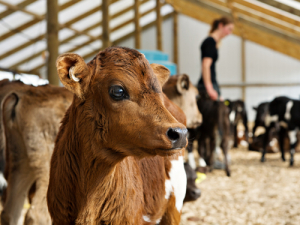State of the Dairy Nation 2024/25: DairyNZ Highlights Record Milk Production and Export Growth
DairyNZ's chief executive Campbell Parker says the 2024/25 dairy season reinforces the importance of the dairy sector to New Zealand.
 Cruel and illegal practices are not in any way condoned or accepted by the industry as part of dairy farming.
Cruel and illegal practices are not in any way condoned or accepted by the industry as part of dairy farming.
DairyNZ chief executive Tim Mackle says cruel and illegal practices are not in any way condoned or accepted by the industry as part of dairy farming.
“The vast majority of farmers care about their animals and we are committed to farming to very high standards,” says Mackle.
“DairyNZ works closely with the wider industry in the management of bobby calves, including the transport sector, meat processors and dairy companies, as well as Federated Farmers and MPI.”
Tim says the video released yesterdat by Farmwatch shows some footage of transport companies and their workers, as well as some unacceptable behaviour by farmers of dragging calves.
“Last year we saw footage of abhorrent treatment and cruelty of calves at a pet food processing plant. Today’s footage of calves being passed and loaded on to trucks is nothing like that footage, and cannot and should not be compared.
“While some of the handling is rougher than we would like, the workers appear to be following the accepted practice of loading calves by rolling them rear end first. Despite perception, this is the best way to prevent calves from stepping back out of the truck and causing themselves harm.”
Mackle added that the new regulations coming into effect in August 2017 addressed this by requiring farmers to have loading platforms and therefore reducing the requirement to lift.
“Many farmers have already taken steps to put loading facilities in place well ahead of the regulations.”
He says that while formal figures are not yet available there was anecdotal evidence of significant improvement over the past season with the numbers of calves that are picked up being fit for transport.
Tim also acknowledges the significant amount of work the sector, and especially the farmers themselves, have done to ensure improvements.
DairyNZ as part of the wider group has focussed on supporting farmers by:
Bobby calf focus events and training, attended by over 2300 farmersUpdated resources and posters for ensuring calves were fit for transport and loading facility designNew bobby calf handling resources.
“While there is still work to do with a minority of farmers, it is important to remember that the vast majority of our dairy farmers are treating their animals with care and respect.”
Recent weather events in the Bay of Plenty, Gisborne/Tairawhiti, and Canterbury have been declared a medium-scale adverse event.
DairyNZ's chief executive Campbell Parker says the 2024/25 dairy season reinforces the importance of the dairy sector to New Zealand.
A New Zealand agribusiness helping to turn a long-standing animal welfare and waste issue into a high-value protein stream has won the Australian dairy sector's top innovator award.
OPINION: A bumper season all around.
Dairy Women's Network (DWN) has announced that Taranaki dairy farmer Nicola Bryant will join its Trust Board as an Associate Trustee.
Rural Women New Zealand (RWNZ) says it welcomes the release of a new report into pay equity.
OPINION: Staying with politics, with less than nine months to go before the general elections, there’s confusion in the Labour…
OPINION: Winston Peters' tirade against the free trade deal stitched with India may not be all political posturing by the…